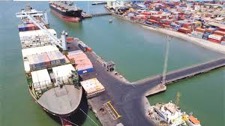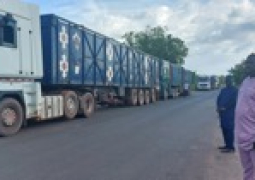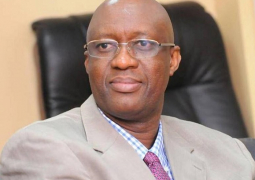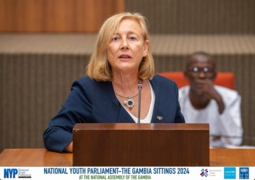
Albayrak project, he said, will operate in Banjul with a minimal investment of six years, while constructing the Sanyang deep-sea, and all upgrades made in the terminal during the six years period in Banjul will still remain operational after Albayrak transfers to Sanyang.
Jobarteh made this disclosure last Friday during a day-long media briefing with journalists concerning the GPA 4th concession expansion project.
Commenting further, he added, the “investor will hold 80% shares from the project, and 20% to GPA with other benefits from the project before the completion of their concession period.
The forum, officials said, was meant to sensitise journalists about the port’s concession expansion project.
During the sensitisation, journalists were also taken through the background of project implementation processes and procedures, the project master-plan and the agreement between GPA and the Albayrak company of Turkey.
Speaking at the opening ceremony, Ousman Jobarteh, the managing director of GPA, underscored the significance of the project.
The forum, Jobarteh continued, would avail journalists the opportunity to widen their understanding about the GPA’s concession expansion project.
He added: “This will go a long way in ensuring transparency in the entire process, so as to enable journalists to adequately report and inform the public about the expansion project.”
“The Port of Banjul has been inundated with growth in traffic to the extent that the facility cannot accommodate the increased volume which has led to congestion, particularly in the past few years.”
“Therefore, there was a need for infrastructure improvement at the Port of Banjul. In fact, this has been highlighted way back in 2002 when a master-plan was commissioned and was prepared by Hamburg board consulting of Germany.”
Jobarteh further stated: “Due to lack of financial resources to commit to the investment that were required, the government has to grapple with funding options which by 2012 was not forthcoming. Again, a new master-plan was then commissioned by way of an update and this was again prepared by an international consulting firm called Doha Consulting from South Korea.”
With the coming of the Barrow government, he said, another master-plan was commissioned and brought forth in 2018 by an international consulting firm called the Royal Haskoning of Netherland.
In July 2019, he added, the government approved the recommendation of the master-plan.
“This master-plan looked at the immediate capacity improvement needs in Banjul. The master-plan also looked at alternative locations of the Seaport away from Banjul in one of the southern coasts in search of deeper-water, due to physical constraints faced by Banjul in terms of cargo capacity and congestion.”
Jobarteh also gave a summary of their master-plan ranging from its terms, agreements, and possible risk that could be incurred during the 30 years of the concession period.





